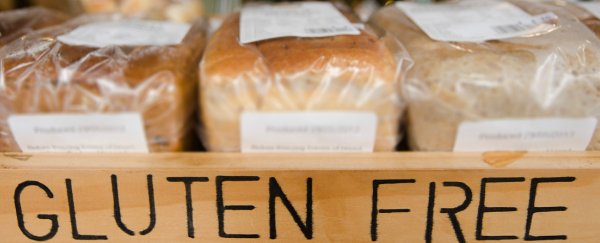Gluten-free foods are great alternatives for coeliacs and those with gluten intolerances and sensitivities, but for everyone else, there's no evidence to suggest that they're any healthier than regular products, according to a new study.
The research compared 3,200 food products in Australia, and found little or no difference between the nutritional value of regular foods and their gluten-free alternatives.
Of course, that doesn't mean gluten-free products are unhealthy. If eating them makes you feel better, there's no reason not to go to town. But with more and more people feeling they should spend exorbitant amounts of money on gluten-free foods for their health, or believing that sugary treats such as cakes are 'healthier' without gluten, the research is a timely cut through the marketing hype.
"Many people need gluten-free food, but there is a growing group who are only trying it for its apparent healthiness," lead researcher Jason Wu from the George Institute for Global Health in Sydney said in a press release. "However, we found on average that gluten and gluten-free foods are just as healthy, or unhealthy as each other."
The study compared supermarket products across 10 categories: bread, breakfast cereal, dry pasta, cereal bars, cakes, sweet biscuits, ice cream, potato chips, processed meats, and lollies.
Their main assessment for a food's health was using the Australian Government's Health Star Rating - which gives one star to the foods with the least nutritional value, and five stars to those with the most. You can read more about how the Health Star Rating is calculated here, but for the purposes of this research, the team found that there was no significant difference between the ratings of gluten-free foods and their regular alternatives.
The team also looked into the nutritional content of their products, and found that there were some differences. For example, gluten-free pasta has on average 52 percent less protein than regular pasta, while gluten-free bread has 32 percent less. But it does have more dietary fibre than regular bread.
On a positive note, the study found no significant difference in the amount of sugar and saturated fat between the two varieties of staple foods, despite international evidence suggesting that gluten-free products use these to overcompensate for lost taste. It was only gluten-free cakes that were deemed to be more sugary. The results have been published in the British Journal of Nutrition.
Wu hopes that his research will help reduce the 'halo' effect that surrounds gluten-free food - when people eat more junk food just because its labelled as a healthy alternative.
"Fancy labels on gluten-free foods have the potential to be used as a marketing tactic, even on products that traditionally don't have any gluten in them anyway," he said. "Misinterpretation by consumers, especially of junk foods, that gluten-free means they are healthy is a real concern."
If you really want to eat better, the old rules still apply - choose plenty of fresh fruit, vegetables and whole grains, and avoid highly processed junk foods.
But the "gluten-free is healthy" fad isn't all bad. As a lot of people have commented on Reddit, it's also led to a whole lot more options for those who can't tolerate gluten. Just don't feel pressured to buy them if you don't need to.
